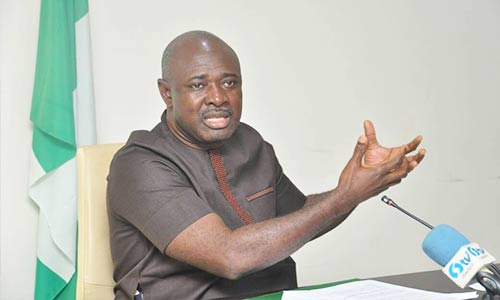$1.3bn Malabu case: Abacha family should just keep quiet – Minister
Minister of State, Petroleum Resources (oil), Heineken Lokpobiri, has urged the family of the late Head of State, General Sani Abacha to “keep quiet” over the resolution reached by the Federal Government on the controversial Oil Mining Licence (OML) 245. The minister spoke on the heels of comments attributed to the son of the late […]

heineken lokpobiri
Minister of State, Petroleum Resources (oil), Heineken Lokpobiri, has urged the family of the late Head of State, General Sani Abacha to “keep quiet” over the resolution reached by the Federal Government on the controversial Oil Mining Licence (OML) 245.
The minister spoke on the heels of comments attributed to the son of the late head of state, Mohammed Abacha, who in a published media report called on the Minister to withdraw the public statement he made claiming that the dispute over OML 245.
Daily Trust reported that Lokpobiri at the Nigerian Oil and Gas Energy Week said the ongoing negotiations to end the disputes surrounding OML 245 have been concluded and that the oil block would resume production in the national interest.
But in a protest letter written to puncture the claims, a Senior Advocate of Nigeria (SAN), Reuben Okpanachi Atabo, said the Abacha family had issued a 14-day ultimatum to Lokpobiri to withdraw the alleged false claim or be slammed with contempt of court charges.
- 200 students were trapped in collapsed school building – Plateau govt
- Tinubu will reshuffle his cabinet in few weeks – Daniel Bwala
In the protest letter received at the office of the Attorney General of the Federation (AGF) and Oil Minister’s offices on July 5, the Abacha family averred that the claim made at the opening session of the “Nigerian Oil and Gas Energy Week” by Lokpobiri was false, spurious, unfounded and an affront to the courts where several cases on ownership of Malabu Oil and Gas are still pending.
Reacting to the statement by the Abacha family, Lokpobiri said: “I don’t want to join issues with the Abacha family, but I can assure you that we are resolving all the issues with OML 245 in accordance with overriding national strategic interest.
“This matter has lingered on for the past 28 years. And if I were a member of the Abacha family, I wouldn’t even raise my head. As Heineken Lokpobiri, I can’t give any Lokpobiri a license. That in itself is criminal. So if they know what they are doing, they should just keep quiet.
“I am a lawyer, I have Doctorate degree, not from Nigeria, I had my Masters and Doctorate degree in England. Nigeria has laws just like any other country, If I were them, how can Abacha as head of state give…I don’t want to join issues with any of them. The point is that I am not involved in whatever they are doing, but I have a job to do.
“Oil blocks are federation assets, and the federal government will do anything that is legal to ensure that Nigerians benefit from the availability of these oil blocks in this country.”
History of Litigation
The OML 245 deal, considered one of Nigeria’s most prolific oil blocks, was acquired by Malabu Oil and Gas, a company belonging to the Abacha family in 1998 for $2 million.
In 2001, the federal government under former President Olusegun Obasanjo revoked Malabu’s license due to “questionable practices.”
In 2006, Malabu challenged the revocation in court, eventually reaching an out-of-court settlement with the government under former President Umaru Yar’Adua.
In 2011, Shell and Eni, two major oil companies, acquired the block for $1.3 billion from Malabu in a deal approved by the Nigerian government.
However, since then, there have been allegations and litigation, as Transparency International and other anti-corruption groups alleged bribery and corruption in the deal.
Speaking on the 28-year crisis and litigation surrounding the prolific oil block, the minister had recently said: “The core issue revolves around the agreement between the federal government, Shell, and ENI, wherein the Federal Government facilitated the transfer of rights from Malabu to Shell/ENI in exchange for consideration. This process was conducted transparently and in accordance with established legal frameworks.”
